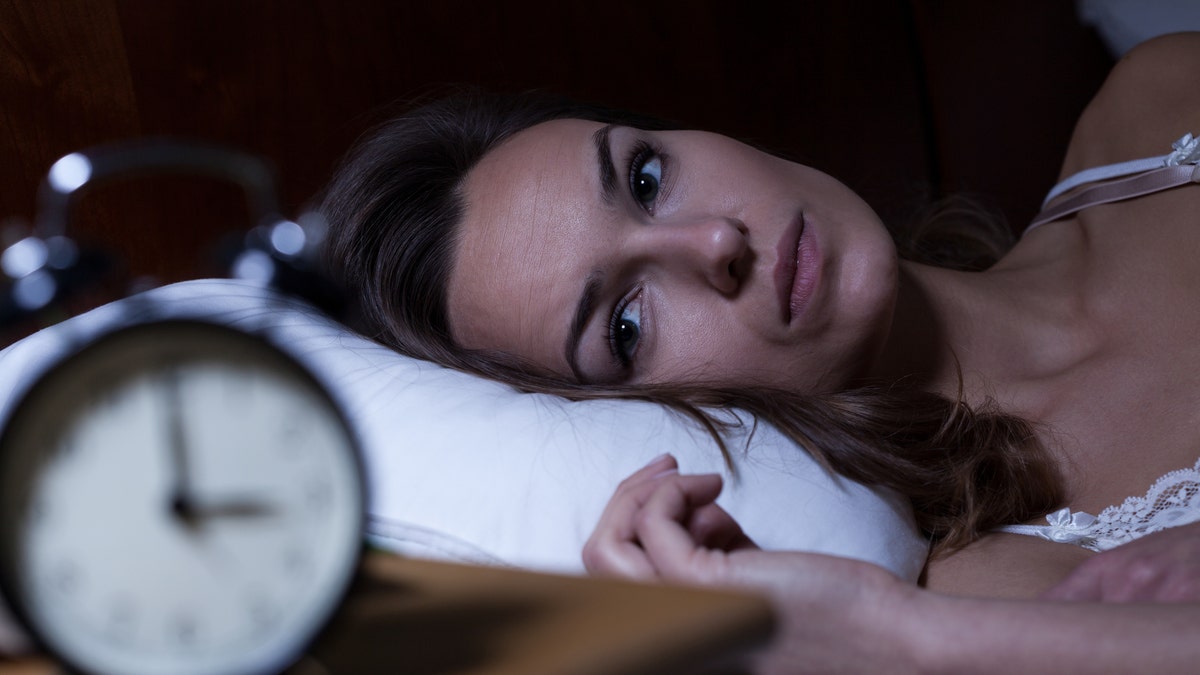
Woman lying in bed suffering from insomnia (iStock)
You already know that you need plenty of sleep, but when you’re tossing and turning all night, watching the hours pass by on your alarm clock and willing yourself to doze off, it can be incredibly frustrating and stressful to get a good night’s rest. As you get older, conditions like arthritis, GERD, sleep apnea and depression can make sleep even harder to come by.
In fact, according to a 2014 survey from the National Sleep Foundation, its most recent data available, about 35 percent of Americans report their sleep quality as poor or fair.
SOLVING YOUR SLEEP PROBLEMS REQUIRES TAKING THIS CRUCIAL STEP FIRST
If find yourself rising at a late hour and need to wake up early the next day, experts say you should avoid these six mistakes:
1. Stay in bed.
If you can’t doze off within 15 or 20 minutes and you’re feeling frustrated, there’s no sense in just lying there. The best thing to do is to get out of bed and do something relaxing like read (a book, not a device), do breathing exercises, progressive muscle relaxation, meditate or listen to music that makes you feel calm.
Then, “you should only go back to bed when you’re ready to go back to sleep again,” Raj Dasgupta, MD, a sleep expert and an assistant professor at the University of Southern California’s Keck School of Medicine, told Fox News.
2. Smoke.
Hopefully you’re already trying to quit, but lighting up because the craving is keeping you awake is a big mistake. Nicotine is a stimulant, and it also disrupts the circadian clock in the lungs and the brain, which can affect your cognition and lead to mood disorders, depression and anxiety, a 2014 study in The FASEB Journal found.
WHAT YOUR PAST HABITS MAY MEAN FOR YOUR FUTURE HEALTH
Smoking when you’re groggy is also downright dangerous. “I’ve had patients who have fallen asleep in the midst of smoking on their coach, they dropped their cigarette and lit their carpet on fire,” Dr. Christopher Winter, a sleep specialist and neurologist in Charlottesville, Virginia and author of “The Sleep Solution: Why Your Sleep is Broken and How to Fix It,” told Fox News.
3. Turn on the TV or a device.
Watching late-night talk shows, checking your email or Facebook feed, or texting a friend is too stimulating when you’re trying to fall asleep. The blue light emitted from electronics inhibits the release of melatonin, the hormone secreted in the brain that’s responsible for maintaining the body’s circadian rhythm.
“Technology is one of the main reasons why we have so many arousals and awakenings during the night, [and] why we have insomnia and sleep deprivation,” Dasgupta said.
YES, USING FACEBOOK MAY BE MAKING YOU MORE LONELY
4. Eat a snack.
Reaching into the refrigerator for a midnight snack can mess with your circadian rhythm and a full stomach can make it harder to sleep. What’s more, spicy foods will give you heartburn and anything with caffeine in it — chocolate included — can keep you up. Although alcohol will help you fall asleep faster, you’ll probably be awake again in no time.
However, if hunger pangs are keeping you awake, it’s OK to have a snack such as yogurt with granola or a handful of nuts. A cup of chamomile tea can help relax you too. Drinking tart cherry juice in the morning and night may also help you get more sleep, research from Louisiana State University presented at the Experimental Biology 2014 meeting suggests.
THE BEST SNACKS TO EAT IF YOU'RE TRYING TO AVOID SUGAR
5. Go to the bathroom
If you wake up and nature calls, by all means take care of business. But if you go to the bathroom when you really don’t have to go, the bright lights can be too arousing and throw off your circadian rhythm.
If you tend to wake up in the middle of the night to go, put a dimmer switch or a nightlight in — and on the way to — the bathroom. If you have to urinate frequently and you also have discomfort or pain, make an appointment with your doctor because it could signal a problem with your prostate, Winter said.
6. Pop melatonin.
Melatonin is touted as a magic sleep aid, but experts warn it should only be taken occasionally, such as when you need to adjust to a different time zone when you’re traveling.
FOLLOW US ON FACEBOOK FOR MORE FOX LIFESTYLE NEWS
Melatonin shouldn’t be taken right before bed either because that’s not the time when the brain naturally secretes it, Winter said. Instead, take it when the sun sets or a few hours before you go to bed so you’re ready to fall asleep when you need to.
To help your body make melatonin naturally, get as much sunshine during the day as possible by opening up your blinds and taking a walk at lunchtime. Then a few hours before you want to turn in, make your home as dim as possible and you should be able to drift off in no time.








































